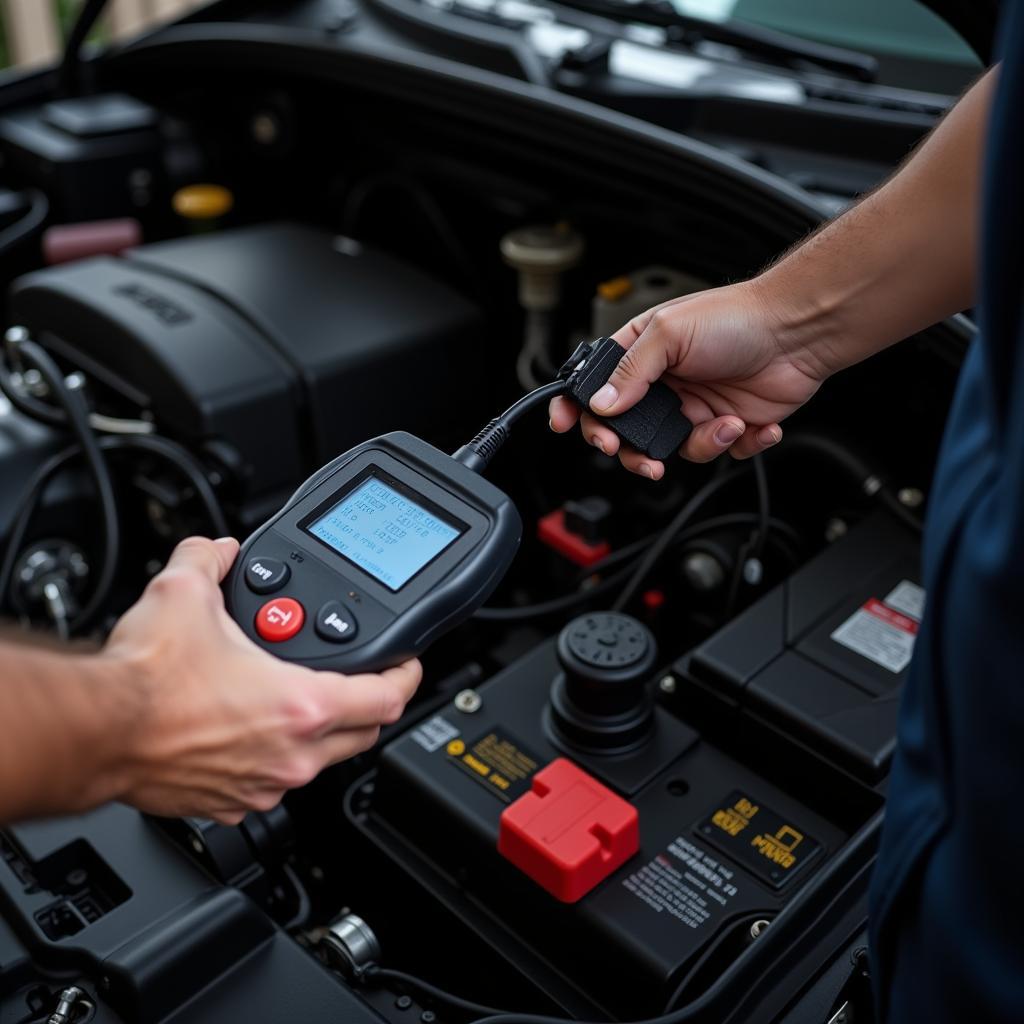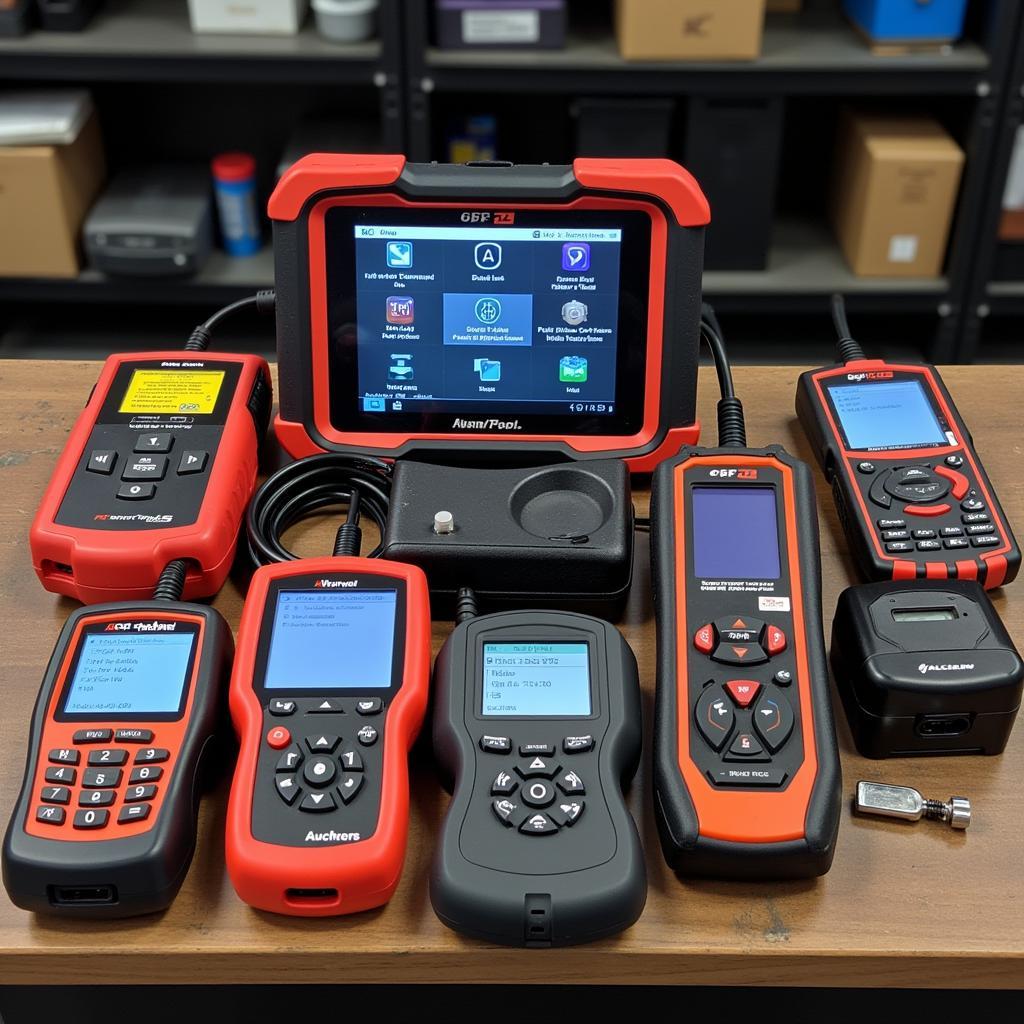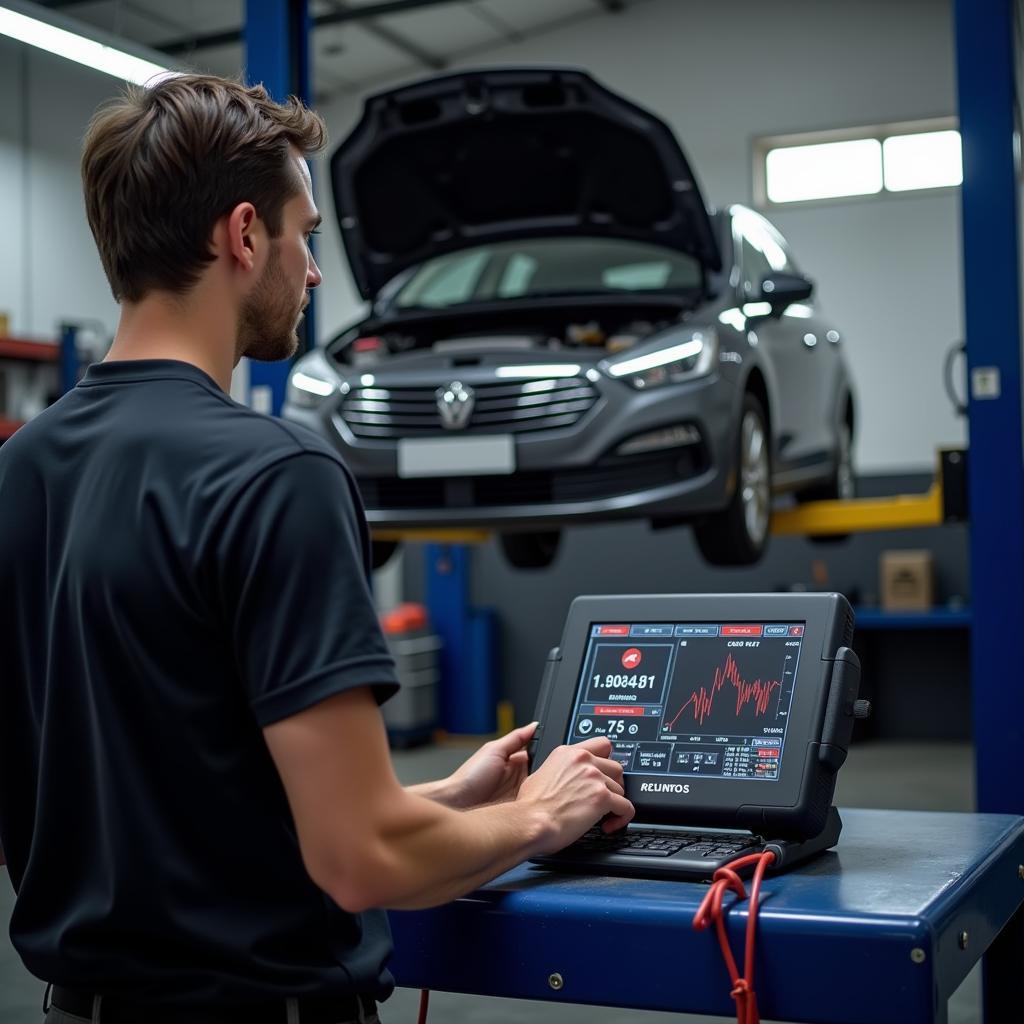Finding the right car diagnostic tool can be overwhelming, especially with so many options available. Whether you’re a seasoned mechanic or a car enthusiast looking to troubleshoot your own vehicle, you need a reliable tool that provides accurate information and is easy to use. This comprehensive guide will delve into the world of car diagnostic tools, helping you determine the best one for your needs and budget.
Understanding Car Diagnostic Tools
Before we dive into specific products, let’s understand what a car diagnostic tool does. In essence, it’s a device that connects to your car’s onboard computer, the Engine Control Unit (ECU), to retrieve diagnostic information. This information can range from simple error codes to real-time data streams about your engine’s performance.
 Mechanic connecting a diagnostic tool to a car
Mechanic connecting a diagnostic tool to a car
Why Do You Need a Car Diagnostic Tool?
Having a car diagnostic tool empowers you to take control of your vehicle’s maintenance. Here’s why:
- Identify Issues Early: Detect problems before they escalate, saving you costly repairs down the line.
- Reset Check Engine Light: Diagnose the reason behind that pesky check engine light and reset it yourself.
- Monitor Car Performance: Track vital engine parameters like fuel efficiency, RPM, and coolant temperature.
- DIY Repairs: For the mechanically inclined, a diagnostic tool allows you to perform basic repairs and maintenance yourself.
- Negotiate Better Deals: When buying a used car, a diagnostic tool can reveal hidden problems, giving you leverage during negotiations.
Types of Car Diagnostic Tools
Car diagnostic tools come in various forms, each with pros and cons:
-
Code Readers: These basic tools primarily read and clear error codes. Affordable and easy to use, they’re ideal for beginners.
-
OBD2 Scanners: Offering more advanced features than code readers, OBD2 scanners can access live data streams, graph sensor readings, and perform some bi-directional tests.
-
Professional-Grade Scan Tools: As the name suggests, these are sophisticated tools used by professional mechanics. They offer extensive diagnostic capabilities, programming functions, and access to manufacturer-specific data.
 Various types of car diagnostic tools displayed on a workbench
Various types of car diagnostic tools displayed on a workbench
Factors to Consider When Choosing a Diagnostic Tool
- Vehicle Compatibility: Ensure the tool is compatible with your car’s make, model, and year.
- Features: Consider your skill level and needs. Do you require basic code reading or more advanced functions?
- User Interface: Look for an intuitive interface with a clear display and easy navigation.
- Software Updates: Regular software updates are crucial to maintain compatibility with newer car models.
- Budget: Set a realistic budget and choose a tool that offers the best value for your money.
Top Car Diagnostic Tools on the Market
Here are some highly-rated car diagnostic tools across different categories:
Best Overall:
Autel MaxiCOM MK908P: This professional-grade tool boasts extensive coverage, advanced coding functions, and a user-friendly interface.
Best Value for Money:
ANCEL AD530: An excellent mid-range option, the ANCEL AD530 offers a good balance of features, performance, and affordability.
Best for Beginners:
FOXWELL NT301: Simple and straightforward, the FOXWELL NT301 is a great entry-level code reader that’s perfect for DIY enthusiasts.
Tips for Using a Car Diagnostic Tool
- Consult Your Owner’s Manual: Familiarize yourself with your car’s specific diagnostic port location.
- Start with a Clear Head: Avoid diagnosing your car when you’re frustrated or rushed.
- Take Notes: Record the error codes and any relevant information for future reference.
- Don’t Overlook the Basics: A diagnostic tool is just one piece of the puzzle.
- Seek Professional Help When Needed: If you encounter complex issues, don’t hesitate to consult a qualified mechanic.
 A mechanic using a diagnostic tool on a car in a garage
A mechanic using a diagnostic tool on a car in a garage
Conclusion
Choosing the best car diagnostic tool requires careful consideration of your individual needs, budget, and technical expertise. By understanding the different types of tools available and the factors to prioritize, you can make an informed decision. Remember, a reliable diagnostic tool can save you time, money, and frustration by helping you stay ahead of any potential car troubles.
FAQs
Q: Can I use any diagnostic tool on any car?
A: No, compatibility varies depending on the car’s make, model, and year. Always check the tool’s specifications before purchasing.
Q: What is the difference between a code reader and an OBD2 scanner?
A: Code readers simply read and clear error codes. OBD2 scanners offer more advanced features like live data streaming and some bi-directional testing.
Q: Do I need a professional mechanic to use a car diagnostic tool?
A: While some tools are designed for professional use, there are many user-friendly options available for DIY enthusiasts.
Q: Can a diagnostic tool fix my car?
A: No, a diagnostic tool only provides information about potential problems. It doesn’t perform repairs.
Q: Where can I find a reputable seller of car diagnostic tools?
A: Reputable online retailers and automotive stores are good places to start your search.
Do you have other questions or need help choosing the right car diagnostic tool? Feel free to contact our team of experts via WhatsApp: +1(641)206-8880 or email us at [email protected]. We’re available 24/7 to assist you!

Leave a Reply